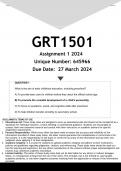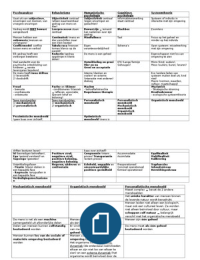Exam (elaborations)
GRT1501 Assignment 1 (ANSWERS) 2024 - DISTINCTION GUARANTEED
- Institution
- University Of South Africa (Unisa)
- Book
- Becoming a teacher
Well-structured GRT1501 Assignment 1 (ANSWERS) 2024 - DISTINCTION GUARANTEED. (DETAILED ANSWERS - DISTINCTION GUARANTEED!). . (DETAILED ANSWERS - DISTINCTION GUARANTEED!). QUESTION 1 What is the aim of early childhood education, including preschool? A) To provide basic care for children before ...
[Show more]




